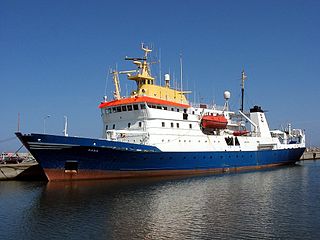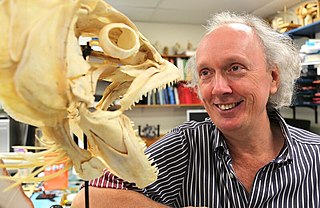Related Research Articles

Fisheries science is the academic discipline of managing and understanding fisheries. It is a multidisciplinary science, which draws on the disciplines of limnology, oceanography, freshwater biology, marine biology, meteorology, conservation, ecology, population dynamics, economics, statistics, decision analysis, management, and many others in an attempt to provide an integrated picture of fisheries. In some cases new disciplines have emerged, as in the case of bioeconomics and fisheries law. Because fisheries science is such an all-encompassing field, fisheries scientists often use methods from a broad array of academic disciplines. Over the most recent several decades, there have been declines in fish stocks (populations) in many regions along with increasing concern about the impact of intensive fishing on marine and freshwater biodiversity.
William Edwin Ricker, is an important founder of fisheries science. He is best known for the Ricker model, which he developed in his studies of stock and recruitment in fisheries. The model can be used to predict the number of fish that will be present in a fishery. He also had an international standing as an entomologist and a scientific editor. He published 296 papers and books, 238 translations, and 148 scientific or literary manuscripts. His 1958 publication, "Handbook of computation for biological statistics of fish populations" and later updates were the standard books on the subject for decades.
Sidney J. Holt was a British biologist who was a founder of fisheries science. He was best known for the book On the Dynamics of Exploited Fish Populations which he published with Ray Beverton in 1957. The book is a cornerstone of modern fisheries science and remains much used today. Holt served with the FAO in 1953 and with other UN agencies for another 25 years. After his retirement in 1979, Holt remained active in work related to the International Whaling Commission and conservation of whales in general, also publishing his views about whaling and fisheries management in academic journals.
Hypothalassia acerba is a large crab found in the muddy substrates of the deep seas off the southwestern Australian and New Zealand coasts. Australian distribution, which is correlated to depth and temperature, ranges from a latitude as far north as approximately 27° S on the west coast, southwards, then eastwards on the south coast to a longitude of at least 129° E. The species usually occurs in waters with temperatures of 13–19 °C (55–66 °F) and in depths ranging of 200–255 metres (656–837 ft) on the lower west coast and 90–200 m (300–660 ft) on the south coast. Body size is inversely related to depth of water. There are only two species in the genus Hypothalassia, and H. acerba is not the same champagne crab as the other Hypothalassia species, H. armata, which is found in Japanese waters.
Peter Robert Last is an Australian ichthyologist, curator of the Australian National Fish Collection and a senior principal research scientist at CSIRO Marine and Atmospheric Research (CMAR) in Hobart, Tasmania. He is an elasmobranch expert and has described many new species of shark.
Gerald Robert "Gerry" Allen is an American-born Australian ichthyologist. His career began in 1963, when he spent a semester at the University of Hawaii, where he also received a PhD in marine zoology in 1971. In 1972, Allen wrote his doctoral thesis on the systematics and biology of the anemone fish.
Kenneth Radway Allen was a New Zealand fisheries biologist.
Professor Jessica Meeuwig is the inaugural director of the Centre for Marine Futures at the University of Western Australia (UWA). In 2012 she was appointed as a Conservation Fellow of the Zoological Society of London and was also named as one of the 100 most influential people in Western Australia by The West Australian newspaper.

Albert Y. Zomaya is currently the Chair Professor of High Performance Computing & Networking and Australian Research Council Professorial Fellow in the School of Information Technologies, The University of Sydney. He is also the Director of the Centre for Distributed and High Performance Computing. He is currently the Editor in Chief of IEEE Transactions on Sustainable Computing and Springer's Scalable Computing and Communications. He was past Editor in Chief of the IEEE Transactions on Computers.

Bronwyn May Gillanders is a marine scientist whose research spans freshwater, estuarine and marine waters while focusing on fish and fisheries ecology. Her studies of the Giant Australian cuttlefish of Northern Spencer Gulf in South Australia revealed the species' sensitivity to increases in salinity; a controversial aspect of the Environmental Impact Study (EIS) for the expansion of BHP Billiton's Olympic Dam mine. Gillanders' discovery was published in the scientific journal Marine Environmental Research and prompted environmental activists to call for the relocation of the project's proposed seawater desalination plant at Point Lowly, due to its proximity to the only mass breeding area for the animals' genetically distinct population. Gillanders commenced work at the University of Adelaide in 2001, received a tenurable position in 2007 and was appointed professor in 2010. She is the Director of the Marine Biology program at the university's Environment Institute.
William Toby White is an Australian ichthyologist. He studies speciation and biodiversity of shark, ray, and skate species through morphological and molecular systematics.
Thavamani Jegajothivel Pandian, a retired professor of Madurai Kamaraj University (MKU), is an Indian geneticist and ecologist, known for his pioneering studies in bioenergetics and animal ecology. A recipient of the WorldFish Naga Award, he is a former chairman of the Task Force Committee on Aqua and Marine Biotechnology of the Department of Biotechnology of the Government of India, a former president and a fellow of The World Academy of Sciences and an elected fellow of the Indian National Science Academy, National Academy of Sciences, India, Indian Academy of Sciences and the National Academy of Agricultural Sciences. The Council of Scientific and Industrial Research, the apex agency of the Government of India for scientific research, awarded him the Shanti Swarup Bhatnagar Prize for Science and Technology, one of the highest Indian science awards, in 1984, for his contributions to biological sciences.

The Australian Society for Fish Biology (ASFB) is a professional organisation of fish and fisheries researchers. Founded in 1971, the society describes itself as a "professional, independent, non-profit, non-commercial and non-aligned organisation." The Australian Society for Fish Biology holds annual conferences for its members, sometimes in partnership with related organisations such as the Oceania Chondrichthyan Society and the Australian Society for Limnology. Former presidents of the society include Hamar Midgley (1977–79), Gerry Allen (1979–81), Julian Pepperell (1991–93) and Bronwyn Gillanders (2012–13).

Oscar Elton Sette, who preferred to be called Elton Sette, was an influential 20th-century American fisheries scientist. During a five-decade career with the United States Bureau of Fisheries, United States Fish and Wildlife Service and its Bureau of Commercial Fisheries, and the National Marine Fisheries Service, Sette pioneered the integration of fisheries science with the sciences of oceanography and meteorology to develop a complete understanding of the physical and biological characteristics of the ocean environment and the effects of those characteristics on fisheries and fluctuations in the abundance of fish. He is recognized both in the United States and internationally for many significant contributions he made to marine fisheries research and for his leadership in the maturation of fisheries science to encompass fisheries oceanography, defined as the "appraisal or exploitation of any kind of [marine] organism useful to Man" and "the study of oceanic processes affecting the abundance and availability of commercial fishes." Many fisheries scientists consider him to be the "father of modern fisheries science."

David Roy Bellwood is an Australian marine biologist. Bellwood studies the ecology, biogeography and evolution of marine fishes, and in 2016 was elected to the Australian Academy of Science.
The K. Radway Allen Award is the highest honour awarded by the Australian Society for Fish Biology. It recognises individuals who have made an "outstanding contribution in fish or fisheries science." The award, inaugurated in 1995, is named for New Zealand fisheries biologist Kenneth Radway Allen.
Peter Colin Young is a British-born ichthyologist and parasitologist who spent most of his career in Australia. From 1995 to 1997, he served as president of the Australian Society for Fish Biology.
John Richard Paxton is a United States-born Australian ichthyologist, who spent most of his career at the Australian Museum. He has a particular research interest in lanternfishes and other deep-sea fishes. Paxton is a founding member of the Australian Society for Fish Biology and received the society's K. Radway Allen Award in 1997.
Andre Eric Punt is a South African fisheries scientist and mathematician, best known for his work on fisheries stock assessment. He received the K. Radway Allen Award in 1999 for his contributions to fisheries science.
Elizabeth A. Fulton, also known as Beth Fulton, is an Australian ecosystem modeller, who was elected a Fellow of the Australian Academy of Science in 2022. She is a Research Group Leader at CSIRO Oceans & Atmosphere in Hobart, Tasmania.
References
- 1 2 3 4 5 6 7 8 9 10 11 12 13 14 15 16 17 "Dr Norman Hall" Australian Society for Fish Biology website. Archived from the original on 2021-05-20. Accessed 2021-05-20.
- 1 2 3 "K. Radway Allen Award", Australian Society for Fish Biology, official website. Accessed 20 May 2021.
- ↑ Hall, Norman G. (2000) "Modelling for fishery management, utilising data for selected species in Western Australia" PhD thesis, Murdoch University (2000). Accessed May 20, 2021.
- ↑ "Winners of 1999 WA Fisheries Reward and Recognition Program congratulated". Government of Western Australia press release. 19 October 1999. Archived from the original on 19 May 2021. Retrieved 20 May 2021.